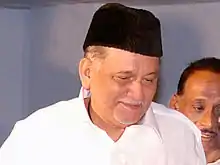Thangal
The thangals are a social group among the Muslims of Kerala, south India (Sunni-Shafi'i).[1] The thangals are often regarded as roughly equivalent to the more general Sayyids/Sharifs (descendants of Prophet Muhammad) of the wider Islamic culture.[2][3] Most members of the community practices endogamy.[4][5]
The thangal families are numerous in Kerala, all receive recognition, but only a few are regarded as saints.[2] The thangal tag brings much 'reverence and attention' in the Kerala Muslim community.[6] Some people take advice from them on crucial matters.[3] There are many thangals in Kerala who 'treat' people for illness and to ward off 'evils'.[3]
Thangal families have many gradations of status on social and economic scale. Influential of the thangals generally come from prominent business families. They usually exercise their influence through commerce and politics.[2]
Major thangal families in north Kerala

- Tharamal family (Mambram)[7][8]
- Sayyid Jifri Thangal (mid-1700s)
- Hassan Jifri Thangal (mid-1700s)
- Syed Alavi Thangal (1749 - 1843)[8]
- Syed Fazl Thangal
- Pukkoya family (Panakkad-Kodappanakkal)[7]
- Sayyid Ali Thangal
- Sayyid Husain ibn Muhlar (1812-1882)
- P. M. S. A. Pukkoya Thangal (d. 1975)
- Shihab Thangal (1936 - 2009)
- Hyderali Shihab Thangal (born 1947)
- Bafaki Thangal family (Calicut)[7]
- Syed Bafaki Thangal (d. 1973)
Notes
- 1.^ Only some scholars consider the thangals as a 'community' among the Muslims of Kerala.[1]
- 2. This article is about the Thangal group practising Islam. Another Thangal group exists in Kerala namboothiri group, both of which may have shared a common ancestry.[9]
References
- Kunhali, V. "Muslim Communities in Kerala to 1798" PhD Dissertation Aligarh Muslim University (1986)
- Miller, Roland E., Mappila Muslim Culture. New York, State University of New York Press, 2015. pp. 268-271.
- Meethal, Amiya (25 April 2016). "Thangals All Set to Test Popularity in Malappuram". Deccan Chronicle.
- Lang, Claudia (1 December 2014). "Muslim Thangals, Psychologisation and Pragmatic Realism in Northern Kerala, India". Transcultural Psychiatry. pp. 904–923. doi:10.1177/1363461514525221.
- Kunhali, V. "Muslim Communities in Kerala to 1798" PhD Dissertation Aligarh Muslim University (1986)
- "Caste system exists among Muslims though not overtly". The New Indian Express. Retrieved 12 October 2020.
- Miller, Roland E., Mappila Muslim Culture. New York, State University of New York Press, 2015. pp. 268-271.
- Miller, Roland. E., "Mappila" in "The Encyclopedia of Islam". Volume VI. E. J. Brill, Leiden. 1987 pp. 458-56.
- "Classification of Original Namboothiris in Kerala". www.namboothiri.com. Retrieved 28 November 2020.
Further reading
- "The Thangals And Way Of The Other Muslims". The Idea of India. 4 June 2011. Retrieved 12 October 2020.
- Ameerudheen, T. A. "Big deal: Merger of two factions of a Muslim group could realign political forces in Kerala". Scroll.in. Retrieved 12 October 2020.
External links
- Kunhali, V. "Muslim Communities in Kerala to 1798 (1986)" (PDF). Aligarh Muslim University. Retrieved 16 September 2020.
- Claudia Lang. "Muslim Thangals, Psychologisation and Pragmatic Realism in Northern Kerala, India" (PDF). SAGE. Transcultural Psychiatry 2014, Vol. 51(6). pp. 904–923.